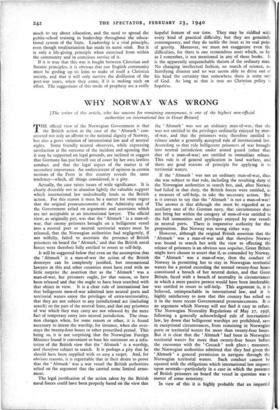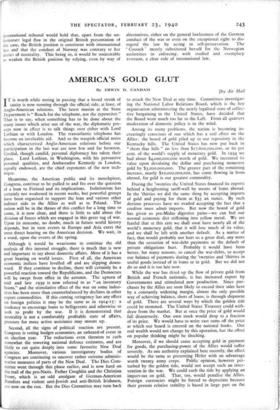WHY NORWAY WAS WRONG
[The writer of this article, who has reasons for remaining anonymous, is one of the highest non-official authorities on international law in Great Britain} THE official view of the Norwegian Government is that the British action in the case of the Altmark ' con- stituted not only an affront to the national dignity of Norway, but also a gross violation of international law and of neutral rights. Some friendly neutral observers, while expressing satisfaction at the outcome of the incident and agreeing that it may be supported on legal grounds, are inclined to suggest that Germany has put herself out of court by her own lawless conduct. and that the legal aspect of the matter is of secondary importance. An undercurrent of opinion in certain sections of the Press in this country reveals the same tendency—which, all things considered, is a pity.
Actually, the case raises issues of wide significance. It is clearly desirable not to abandon lightly the valuable support which international law undoubtedly lends to the British action. For this reason it must be a matter for some regret that the original pronouncements of the Admiralty and of the Government relied on arguments and assertions which are not acceptable to an international lawyer. The official view, as originally put, was that the Altmark ' is a man-of- war, that enemy prisoners brought on a belligerent vessel into a neutral port or neutral territorial waters must be released, that the Norwegian authorities had negligently, if not wilfully, failed to ascertain the presence of British prisoners on board the Altmark,' and that the British naval forces were therefore fully entitled to resort to self-help.
It will be suggested below that even on the assumption that the Altmark ' is a man-of-war the action of the British destroyer can be completely justified, but international lawyers in this and other countries must have read with no little surprise the assertion that as the Altmark ' was a man-of-war, her prisoners ought, for that reason,, to have been released and that she ought to have been searched with that object in view. It is a clear rule of international law that belligerent men-of-war admitted into neutral ports and territorial waters enjoy the privileges of extra-territoriality, that they are not subject to any jurisdictional act (including search) on the part of the neutral State, and that any prisoners of war which they may carry are not released by the mere fact of temporary entry into neutral jurisdiction. The situa- tion changes when, for some reason or other, it is found necessary to intern the warship, for instance, when she over- stays the twenty-four hours or other prescribed period. This being so, it is not surprising that the Norwegian Foreign Minister found it convenient to base his statement on a refu- tation of the British view that the Altmark ' is a warship, and therefore subject to search. It is perhaps a pity that he should have been supplied with so easy a target. And, for obvious reasons, it is regrettable that in their desire to prove that the Ahmark ' was a war vessel the British authorities relied on the argument that she carried some limited arma- ment.
The legal justification of the action taken ,by the British naval forces could have been properly based on the view that the Altmark ' was not an ordinary man-of-war, *that she was not entitled to the privileges ordinarily enjoyed by men- of-war, and that the prisoners were therefore entitled to release under a generally accepted rule of international law. According to that rule belligerent prisoners of war brought into neutral jurisdiction under armed guard (other than that of a man-of-war) are entitled to immediate release. This rule is of general application in land warfare, and there are good reasons of principle for applying it to territorial waters.
If the Altmark ' was not an ordinary man-of-war, then she was subject to that rule, including the resulting duty of the Norwegian authorities to search her, and, after Norway had failed in that duty, the British forces were entitled, as a measure of self-help, to take the necessary action. But is it correct to say that the Altmark ' is not a man-of-war? The answer is that although she must be regarded as an auxiliary unit of the German navy, that circumstance does not bring her within the category of men-of-war entitled to the full immunities and privileges enjoyed by war vessels in neutral ports. There is impressive authority for that proposition. But Norway was wrong either way.
However, although the original British assertion that the Altmark ' was a man-of-war and that therefore Norway was bound to search her with the view to effecting the release of prisoners is an obvious non sequitur, Great Britain Might have chosen to assert that if,-as contended by Norway, the Altmark ' was a man-of-war, then the conduct of Norway in permitting her to stay in Norwegian territorial waters for a period exceeding the normal twenty-four hours constituted a breach of her neutral duties, and that Great Britain, faced with a breach of neutrality in circumstances in which a mere passive protest would have been intolerable, was entitled to resort to self-help. This argument is, it is believed, unimpeachable in international law, and it is highly satisfabtory to note that this country has relied on it in the more recent Governmental pronouncements. It is an argument which Norway will not find it easy to refute. The Norwegian Neutrality Regulations of May 27, 1938, following a generally acknowledged rule of international Iaw, lay down that belligerent warships are prohibited, save in exceptional circumstances, from remaining in Norwegian ports or territorial waters for more than twenty-four hours. But it is clear that the Altmark had been in Norwegian territorial waters for more than twenty-four hours before the encounter with the ' Cossack took place ; moreover, the Norwegian authorities admitted that they had given the Altmark ' a general permission to navigate through the Norwegian territorial waters. Such conduct cannot be squared with the obligations which international law imposes upon neutrals—particularly in a case in which the presence of British prisoners on board the vessel in 'question was a matter of some notoriety. - In view of this it is highly probable that an impartial international tribunal would hold that, apart from the un- fortunate legal flaw in the original British presentation of the case, the British position is consistent with international law and that the conduct of Norway was contrary to her duties of neutrality. This being so, it would be undesirable to weaken the British position by relying, even by way of alternatives, either on the general lawlessness of the German conduct of the war or even on the exceptional right to dis- regard the law by acting in self-preservation. The ' Cossack ' merely substituted herself for the Norwegian authorities in enforcing, with studied and exemplary restraint, a clear rule of international law.







































 Previous page
Previous page